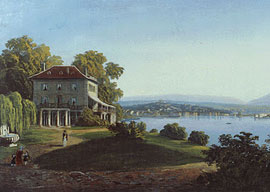
December 06, 2013

Villa Diodati
NEW YORK—I’m in an extremely happy state as I write this because a young Englishman flew over the ocean just to have lunch with me and ask for my daughter’s hand in marriage. This is how things used to be done, but alas no longer. I will not reveal his name until it happens—I am very superstitious—but suffice it to say he went to Eton and Oxford, comes from a fine and very old English family, and has a beautiful sister who is happily married (but unfortunately not to me).
So in this pleasant state of mind, I’m only going to write about nice things. Up to a point, of course.
Such as what good things one reads in the dear old Speccie, which I get one week later than the rest of you. When my son, a German Expressionist painter now living in Paris, besieged me twenty years ago at age twelve to buy a Basquiat, I dismissed his advice as the impressionable foolishness of extreme youth. Basquiat to me was a horrible graffiti showoff for whom Andy Warhol had a crush. I predicted he would disappear the day, night rather, he overdosed. Which he did—overdose—but reading about the arts in these here pages two weeks ago, I learned a thing or two. Like to listen to a 12-year-old who also painted graffiti and had met Mr. B, for starters. I could have bought him for peanuts, and although he still doesn’t race my motor one bit, I could have sold him for 48 million big ones and gone whoring downtown.
Lesson number one: Listen at times to 12-year-olds. Lack of experience in the ways of the world can be enlightening as well as profitable. Lesson number two, and here I quote Niru Ratnam in the Speccie: “Sportsmen, actors, musicians, and entrepreneurs” who buy modern art, as well as oligarchs, sheiks, and hedge-funders, have a seismographic alertness of where the money will go, and they buy accordingly. The art market is now fueled by these bums, and poor little Taki is left on the shelf pining for Edward Hopper (who, thank God, is also going for millions). The problem with not taking my son’s advice was not entirely my fault. Just before JT had insisted that here was a serious artist, I had given a dinner at my house for the great Hilton Kramer, the American critic who—and here I again quote from the Spectator—had dismissed Basquiat as a “talentless hustler, street-smart but otherwise invincibly ignorant, who used his youth and his skin colour and his abundant sex appeal to win an overnight fame….” I agreed and still agree, and this is why my son thinks me a very nice man who is a complete fool.
Oh well, turning the page, I then read about Polidori and Byron by Lucy Hughes-Hallett, and here again my family was involved. I grew up (in a manner of speaking) in Villa Diodati on the banks of Lake Geneva when my greatest friend, Philippe Washer—the Belgian heir and tennis champion—owned it. It was the house where Byron and Mary Shelley wrote ghost stories on a dark and stormy night. They chose the name Frankenstein, my wife’s ancestor, because he was Austrian ambassador to Switzerland and known to be the nicest man ever. The family has never recovered.